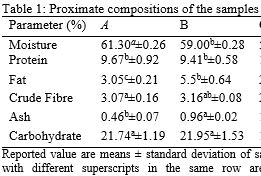Nutrients and Phytochemical Composition of three Commonly Consumed Local Dish in Ohaji Egbema Local Government, Imo State
DOI:
https://doi.org/10.54117/ijnfs.v4i1.83Keywords:
Nutrients, Phytochemical, Local Dishes, Oha soup, Ukazi, Ugba, FlavonoidsAbstract
Background: Nutrient and phytochemical analysis plays a crucial role in understanding the nutritional composition and potential health benefits of traditional dishes.
Aim: The nutritional and phytochemical properties of three commonly consumed local dishes in Ohaji Egbema Local Government Area, Imo State, were investigated.
Materials and Methods: Three samples were analyzed: oha soup with eba, ukazi soup with fufu, and ugba. The samples were examined for mineral content (calcium, iodine, and iron), vitamins (Vitamin A, C, and E), phytochemicals (lignans, flavonoids, and phytoestrogens), and proximate composition (moisture, carbohydrate, fat, protein, crude fiber, and ash) using standard analytical methods.
Results: The highest and lowest vitamin C levels were recorded in oha soup with eba (97.70±4.67 mg/100 g) and ukazi soup with fufu (28.40±2.26 mg/100 g), respectively (p<0.05). Ugba had the highest levels of pro-vitamin A (1429.84±272.00 IU), vitamin E (21.79±0.61 mg/100 g), protein (18.25±0.35%), fat (22.25±0.35%), iodine (25.50±1.0 mg/100 g), and lignans (20.69±0.96 mg/100 g) (p<0.05). The lowest levels of protein (9.41±0.58%), iodine (12.84±0.87 mg/100 g), vitamin E (6.36±0.73 mg/100 g), lignans (7.58±0.27 mg/100 g), phytoestrogens (1.03±0.08 mg/100 g), and flavonoids (0.96±0.09 mg/100 g) were recorded in ukazi soup with fufu (p<0.05).
Conclusion: The local dishes, particularly oha soup with eba and ugba, were rich in protein, pro-vitamin A, vitamin E, iodine, vitamin C, and lignans. These dishes may serve as adequate dietary options for the treatment of protein-energy malnutrition and are good sources of antioxidants for the management of cancer.

Downloads
Published
How to Cite
Issue
Section
License
Copyright (c) 2025 Ihuoma Mary Nnadi, Udoka Patricia Nnadi, Oluchi Grace Chikere

This work is licensed under a Creative Commons Attribution 4.0 International License.
